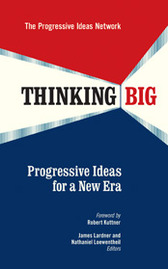Thinking Big
Progressive Ideas for a New Era
The Progressive Ideas Network (Author) | James Lardner (Author) | Nathaniel Loewentheil (Author)
Publication date: 01/15/2009
Times are changing. Instead of obsessing about what they’re against, progressives have begun to think about what they’re for—to prepare once again to play their role as agents of bold ideas and political and social transformation. Finding new confidence and imagination, they have begun to renew their political capital. The essays in this volume draw on that new store of capital to sketch the outlines of a progressive agenda for 21st-century America.
Authors such as Van Jones, Dean Baker, Andrea Batista Schlesinger and Miles Rapoport cover a wide array of topics and, in their policy recommendations, present a few contrasting ideas. But all these essays reflect a belief in the need for fundamental change. The problems discussed here cannot be solved, the authors agree, through charity, through volunteerism, or even by well-meaning local and state governments, though surely all have a role. The contributors make the case for the kind of concerted action that can only come through the agency of our national government. They argue that we need programs that serve our national and international needs and encourage faith in our public institutions, creating a positive cycle of political change and space for further reform.
There are many good reasons to be worried at this critical moment in history. To navigate these troubled times, we need a rare combination of ideas, action, resolve, and leadership to meet the challenges that lie before us. Thinking Big is an indispensable piece of that puzzle, arriving just when it’s most needed.
With a foreword by Robert Kuttner, author of Obama’s Challenge: America’s Economic Crisis and the Power of a Transformative Presidency.
The Progressive Ideas Network is an alliance of multi-issue think tanks and activist organizations working together to amplify the power of ideas in advancing today’s progressive movement.
Formats
Paperback - $14.95 - Members: $13.46
Paperback - $14.95 - Members: $13.46
ePub - $9.95 - Members: $6.97
PDF eBook - $9.95 - Members: $6.97
Find out more about our Bulk Buyer Program
- 10-49: 20% discount
- 50-99: 35% discount
- 100-999: 38% discount
- 1000-1999: 40% discount
- 2000+ Contact ( bookorders@bkpub.com )
Orders of 10+ copies shipping to one address receive free ground shipping
within the U.S. Shipping to separate individual addresses via USPS media mail will be applied a handling fee:
Book Details
Overview
Times are changing. Instead of obsessing about what they’re against, progressives have begun to think about what they’re for—to prepare once again to play their role as agents of bold ideas and political and social transformation. Finding new confidence and imagination, they have begun to renew their political capital. The essays in this volume draw on that new store of capital to sketch the outlines of a progressive agenda for 21st-century America.
Authors such as Van Jones, Dean Baker, Andrea Batista Schlesinger and Miles Rapoport cover a wide array of topics and, in their policy recommendations, present a few contrasting ideas. But all these essays reflect a belief in the need for fundamental change. The problems discussed here cannot be solved, the authors agree, through charity, through volunteerism, or even by well-meaning local and state governments, though surely all have a role. The contributors make the case for the kind of concerted action that can only come through the agency of our national government. They argue that we need programs that serve our national and international needs and encourage faith in our public institutions, creating a positive cycle of political change and space for further reform.
There are many good reasons to be worried at this critical moment in history. To navigate these troubled times, we need a rare combination of ideas, action, resolve, and leadership to meet the challenges that lie before us. Thinking Big is an indispensable piece of that puzzle, arriving just when it’s most needed.
With a foreword by Robert Kuttner, author of Obama’s Challenge: America’s Economic Crisis and the Power of a Transformative Presidency.
The Progressive Ideas Network is an alliance of multi-issue think tanks and activist organizations working together to amplify the power of ideas in advancing today’s progressive movement.
About the Authors
Excerpt









